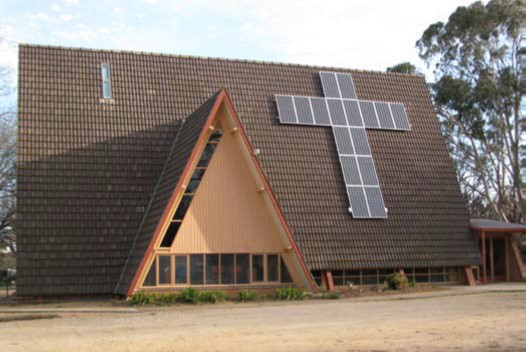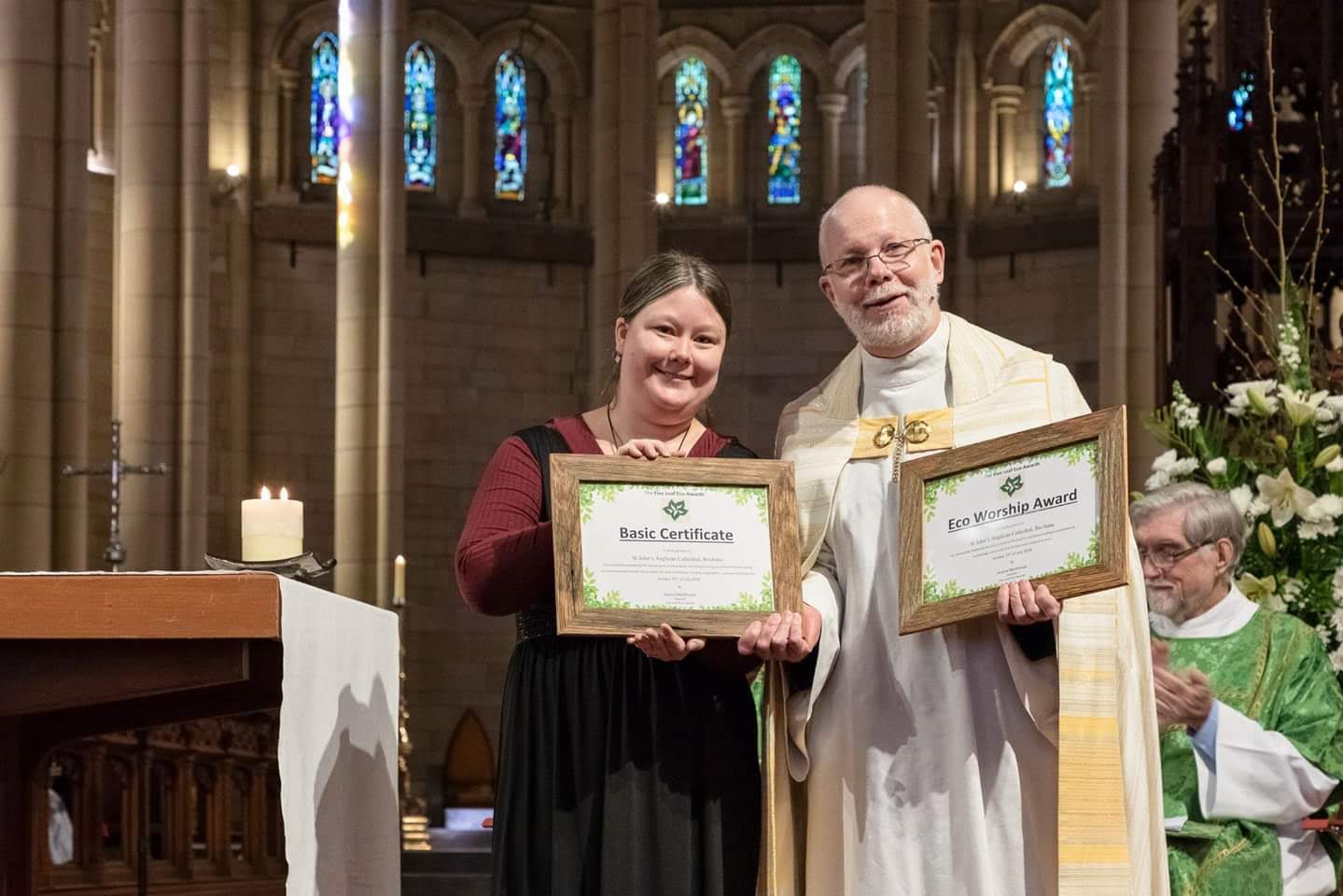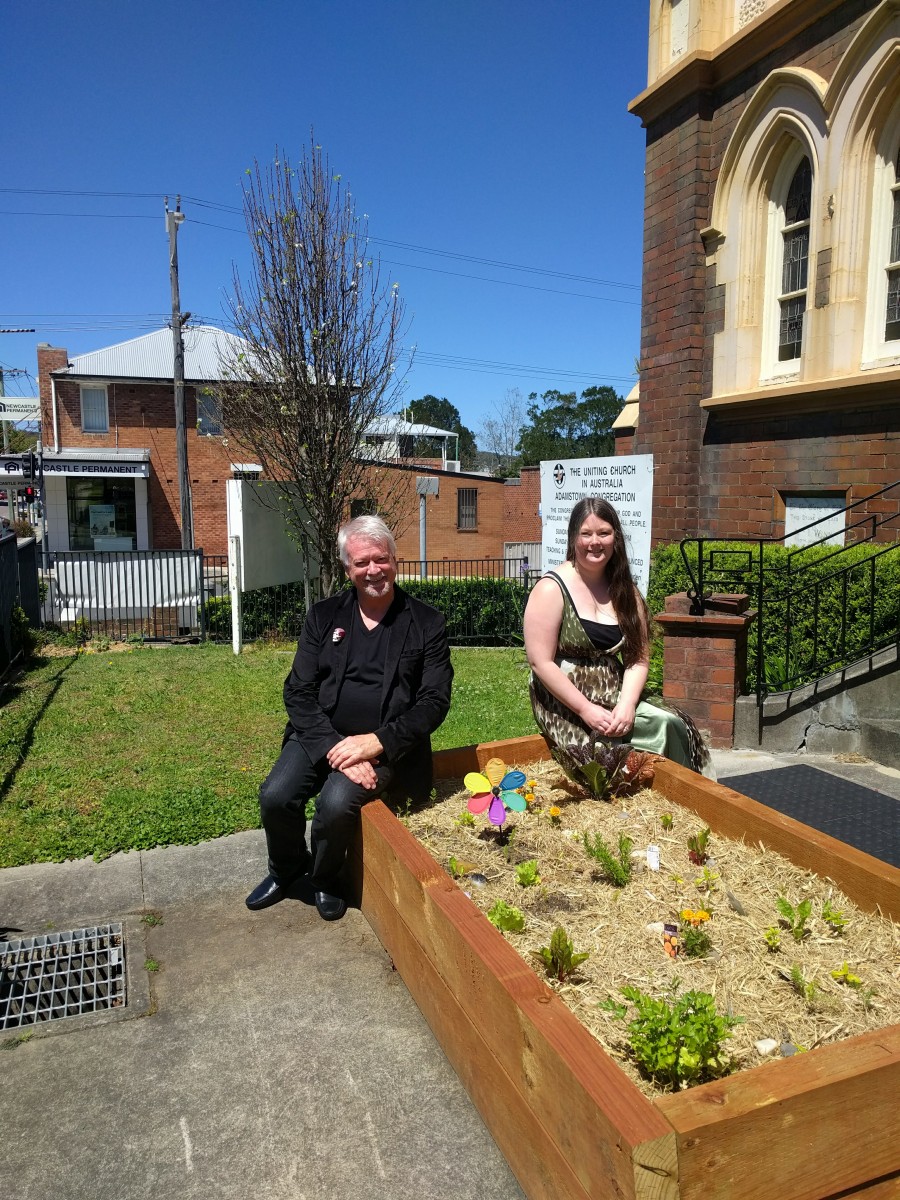 |
|
O'Connor Uniting Church, ACT.
|
I was very conflicted growing up, feeling torn in two directions. On the one side was my deep and abiding love for nature and for all living creatures – a gift I believed came from God. On the other, my Christian faith, and the pursuits I’d been told that served God.
I was sure God couldn’t be any happier about species extinction than I was, but I never heard the environment mentioned in church as more than a backdrop to the story. It seemed like if I was serious about my faith, I should be trying to become a minister (though my fear of public speaking made that unlikely).
In mid-2008, two things happened that changed my life. First, I met Bishop George Browning, then Anglican Bishop of Canberra-Goulburn and chair of the Anglican Communion Environmental Network (ACEN), and heard him speak about a different (ecological) way of reading scripture.
Second, I had the privilege of being invited to attend an Interfaith Youth Camp on Climate Change in Indonesia. To prepare, we were asked to develop a 10-minute speech about what our faith had to say about the environment.
That sent me into a panic, as I didn’t want to just repeat the ‘Christians believe that God gave humans dominion over the earth, so they can exploit it as much as they like’ lines I had heard from society – and Bishop Browning had given me my first inkling that maybe not all Christians agreed. So I went searching for books and discovered the field of eco-theology – and I’ve never really looked back.
It was a revelation to me at the time (though it stuns me now how blind I was!) to realise how much of the Bible talks about God’s love for creation, God’s love for all creatures and the responsibility God gives us to care for both. It felt like getting to know God all over again – and this was a God I liked! I was sceptical at first and wanted to make sure everything I read was fully Biblical and literal, to reassure myself that I wasn’t just reading into the Bible what I wanted to see, but slowly I became convinced. God did want me to love and care for the environment – I had found my life’s calling.
Returning from Indonesia, I started looking around at the churches I knew and asking what they were doing for the environment. It didn’t seem to be a lot and that was puzzling – because if the Bible said all these great things about creation care, shouldn’t Christians actually be leading the worldwide environment movement? So I decided to try to give them some extra encouragement.
Thus, in November 2008, at 21, I founded the Five Leaf Eco-Awards, an ecumenical environmental change program for churches. The five leaves represent the areas of buildings, worship, congregation, outreach and community leadership. There are a range of criteria in each area, which churches complete to receive their awards. There are six main categories – the Basic Certificate, an introductory award which requires action in all five areas, and an advanced award in each area or ‘leaf’. It’s a similar idea to an accreditation, but voluntary and more fun!
By January 2009, I had my first award-winning church, Port Melbourne Uniting Church, which had been working on an awesome Eco Project and community garden with the leadership of Janet Hoare, its environmental manager.
Fast-forward to 2020 and we have over 35 churches with awards, from every state and territory in Australia, and many more churches who would be eligible for an award if they’d heard of the program! (Hint, visit https://fiveleafecoawards.org/ and click on the “Survey” button to see if your church is eligible for recognition.)
 |
|
 |
|
|
(Top) Jessica presenting the Five Leaf Eco-Award at St John's Anglican Catheral, Brisbane; (Bottom) children's garden at Adamstown Uniting Church, NSW.
|
Award criteria are designed to be flexible and there’s huge variety among the churches which have earned awards. Many have found that community gardens are an amazing way of connecting with their community, while also helping the environment. Some even save lives! (I remember a conversation with the minister about one garden, who believed it had saved the lives of at least five lonely and isolated people in her community by helping them to find connection and belonging.)
Some community gardens have been extended to include native gardens or indigenous food gardens and host a variety of workshops. For example, St George’s Uniting Church in Eden built its tool shed as part of a mud-brick house building workshop. Others have included art pieces, like the mosaic at Warrandyte Uniting Church, which includes tiles painted by over 1,000 community members – or found ways to be more inclusive, like the Children’s Garden Bed at Adamstown Uniting Church.
Many churches have solar panels, and several even have solar panel crosses, such as the one at O’Connor Uniting Church in the ACT.
Churches like Charlestown Anglican Parish and Terrigal Uniting Church have done amazing work restoring local bushland and waterways, Brunswick Uniting Church holds a ‘Blessing of the Bikes’ service each year and there is an annual Eco-Fair at St Luke’s Anglican Parish, Mosman Park.
The Church of Christ, at Wembley Downs, has established an environment policy, St Luke’s Anglican, Maylands, held a ‘Hot Gospel’ lecture series and bell ringing for climate change and the Catholic Parish of Saints Peter and Paul organised a year of celebrations, actions, prayer, fun and reflection on the environment in its ‘Lighthouse Project’.
Canberra Baptist has an amazing community garden and has raised funds from its congregation and solar panels to support a project in Bangladesh, in an area impacted by climate change. St Saviour’s Anglican Church, Boyup Brook, in rural Western Australia, brought together all of the sustainability groups and craft makers in its local community for an eco-Spring Fair.
St Luke’s Uniting in Highton has an impressive repair café and Men’s Shed, and reduced its energy use by 22% in one year. Adamstown UC will be holding another incredible ‘Inspiracy’ sustainability festival (with a focus on the arts and music) this September, and Sophia’s Spring is entirely focused on eco-theology and creation care as an eco-feminist community of the Uniting Church that meets at CERES.
St John’s Anglican Cathedral is another favourite of mine. The contrast between the soaring gothic revival-style architecture and the chicken coop, beehive and giant worm farm out the back is just delightful.
I can’t do any of these churches, and all the hard work they have done, justice here – but I hope I’ve whetted your appetite to find out more and to see what other churches around you are doing. It is clear to me that the Holy Spirit has been working hard to prompt people at the grassroots all around the world into action on climate change and creation care and it’s wonderful to see.
What have I learned through all this? Probably the biggest thing is to have hope and to be open to being surprised by what God is doing. Whenever I’m feeling like we aren’t taking action quickly enough on climate change, or that what I do isn’t enough to make a difference, I think about these churches. I think about what is usually just one or two people in each initiating action, pushing themselves to make these incredible things happen. I think about the privilege of being able to visit, to present them with a certificate and recognise that achievement, while also encouraging their whole congregation to own their environmental work more and work together towards the next award. I think about how inspired people are when I show photos of these churches and they realise (a) that they aren’t alone (there is a huge network of other churches out there taking action) and (b) all the new wonderful and creative things they could do with their church and to connect with their communities.
I encourage people not to see environmental ministry in churches as an extra, or just another thing they have to do. First, it’s not optional. This is core church business and an essential part of being a disciple of Jesus in a time of vast global ecological destruction. Second, it can be the best way to achieve your other goals as a church! Want to connect with your wider community? Why not try a community garden or repair café? Want to show people that you care about them and what matters to them? Why not hold a lecture series on climate change or a local environmental issue? Want to show your solidarity and stand with the people you’re trying to reach? Why not join a climate strike or rally? Want to empower people? Why not hold some urban ecology workshops or teach them to make beeswax wraps? Want to help stressed people relax? Help them to connect with nature and find God, and healing, there.
You get the gist. Environmental ministry is full of opportunities and it helps us to become better, deeper followers of Jesus. That’s certainly been my story.
Jessica Morthorpe is the Founder and Director of the Five Leaf Eco-Awards.
For more information visit https://fiveleafecoawards.org/ or email Jessica at fiveleafecoawards@gmail.com
